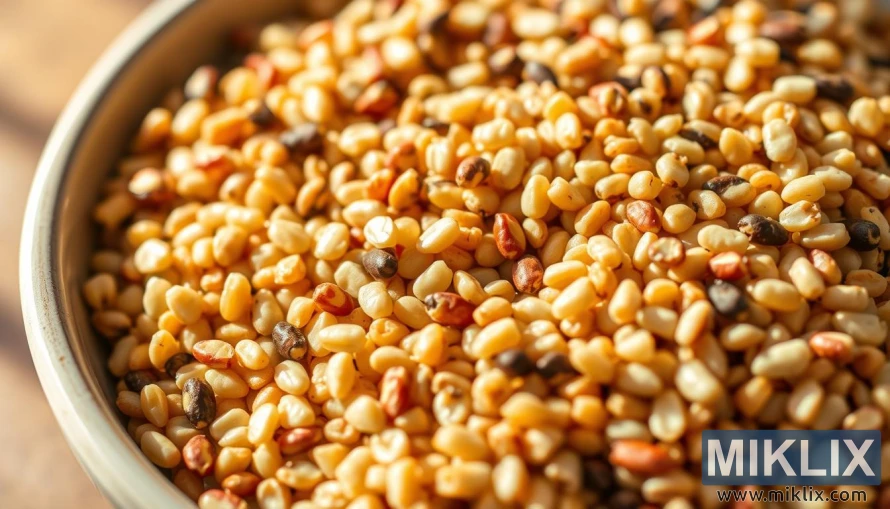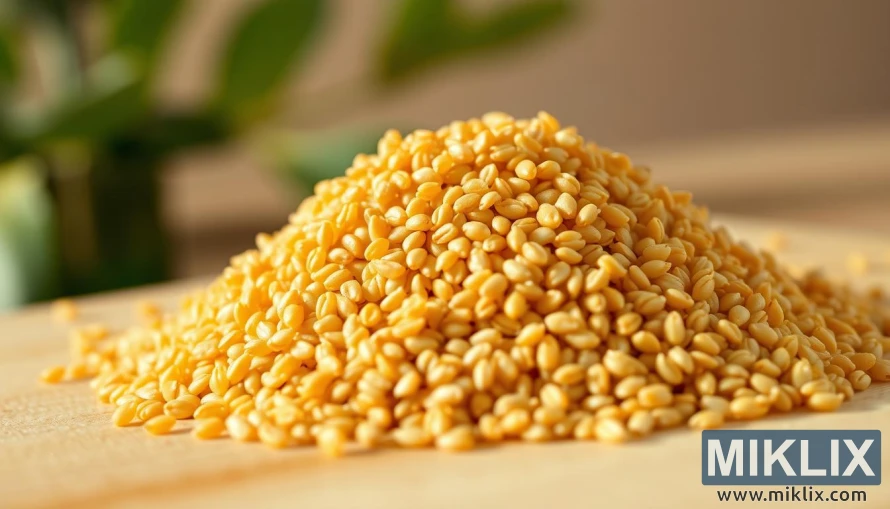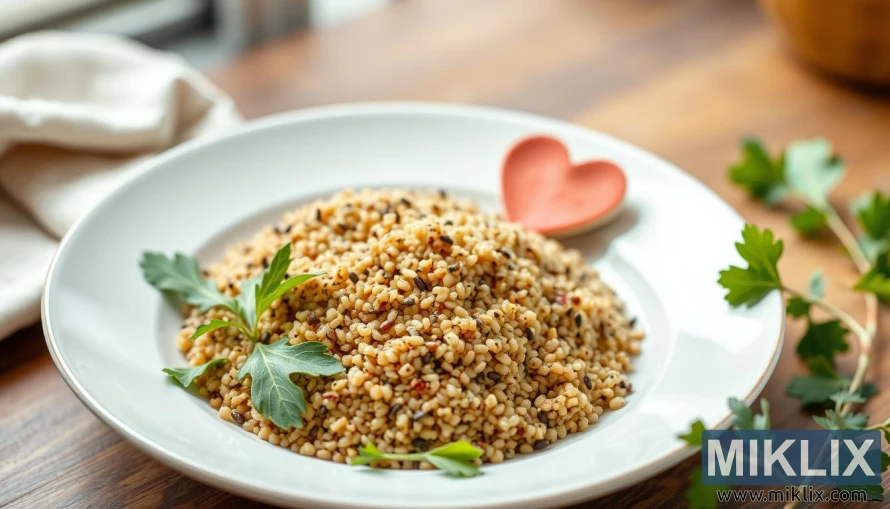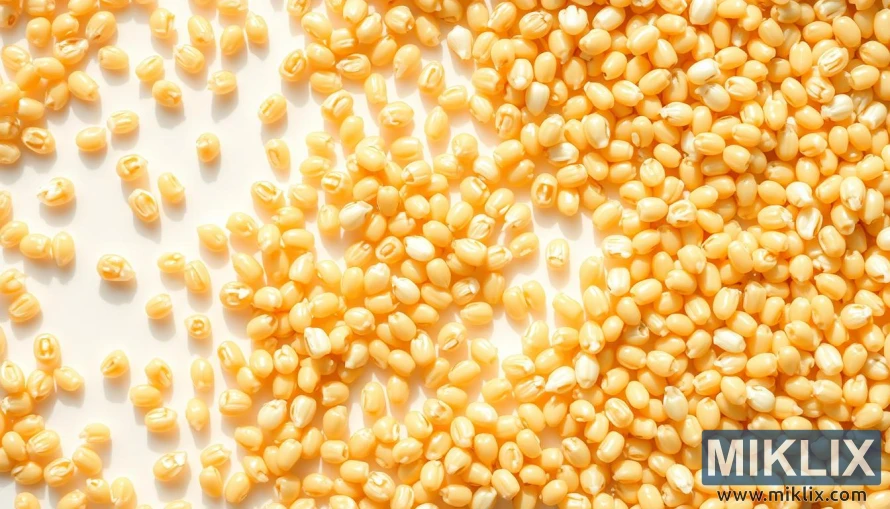Quinoa: Tiny Grain, Big Impact on Your Health
Published: May 12, 2025 at 8:28:32 PM UTC
Last updated: December 26, 2025 at 10:59:49 AM UTC
Quinoa is known as a superfood and loved by health fans worldwide. It comes from the Andes Mountains and is famous for its health perks. This grain is packed with nutrients and easy to add to meals. It's great for those who need gluten-free options or want to improve their health. Learning about quinoa's benefits will make you want to eat it more often.

Key Takeaways
- Quinoa is a nutrient-rich superfood that offers numerous health benefits.
- It serves as a great source of protein and fiber.
- This grain is a perfect choice for those in need of gluten-free grains.
- Incorporating quinoa into your diet can lead to improved overall health.
- Quinoa’s versatility makes it easy to add to various recipes.
- The grain has a long history of cultivation, dating back over 5,000 years.
Introduction to Quinoa as a Superfood
Quinoa, pronounced "KEEN-wah," has traveled from ancient times to today's diets. It's known for its rich nutrients, making it a hit with health fans.
For centuries, quinoa was loved, called "the mother of all grains" by the Incas. It was valued for its nutrition and cultural role. Now, its health perks are attracting attention from nutrition experts and food lovers. It's packed with protein and fiber, great for boosting your diet.
As people turn to ancient grains, quinoa is becoming a key ingredient in U.S. kitchens. It fits into many dishes, from salads and soups to breakfasts and sweets. Its growing popularity shows a move towards healthier eating and a better understanding of food's origins.
What is Quinoa?
Quinoa is a unique food that's often called a pseudocereal. It's not like wheat or rice, but has seed-like qualities. This makes it stand out. It comes in different types, like white, red, and black quinoa, each with its own taste and texture.
When you cook a regular serving of quinoa, you get about 185 grams. This amount has 222 calories and 8 grams of protein. It's also packed with minerals like magnesium and iron. This makes it a great choice for a healthy meal.
Packed with Nutrients
Quinoa is a superfood because of its rich nutrient profile. It's packed with vitamins like folate, copper, and iron. It also has manganese, which is key for metabolism and fighting off free radicals.
One cup of quinoa gives you a lot of fiber. This helps your digestion and keeps you full. Plus, its antioxidants help protect your body from damage. So, quinoa is a great choice for a healthy diet.

Quinoa: A Source of Complete Protein
Quinoa is a standout among plant-based protein sources. It's a complete protein, meaning it has all nine essential amino acids our bodies can't make. This is great news for vegetarians and vegans, who often find it hard to get enough of these nutrients.
Adding complete protein quinoa to your meals can help fill this protein gap. It's a tasty and easy way to get the protein you need without animal products. You can toss it into salads, stir-fries, or bowls, making it a favorite among health enthusiasts.
As more people turn to plant-based diets, knowing about quinoa's protein benefits is key. Eating quinoa ensures your body gets all the amino acids it needs. This is good for your muscles and overall health.
Higher in Fiber Than Many Grains
Quinoa is a standout among high fiber foods. It has about 5.18 grams of fiber per one-cup serving. This is more than many popular grains, like brown rice. Adding quinoa to your meals boosts your daily fiber intake.
The fiber in quinoa does more than just add numbers. It's great for your digestive health. It helps keep your gut healthy, promotes regular bowel movements, and prevents constipation. It also makes you feel full, which can help with weight management.
Quinoa not only satisfies hunger but also lowers the risk of heart disease and type 2 diabetes. By choosing quinoa over less fiber-rich grains, you get to enjoy tasty meals while feeding your body well.
Quinoa is Naturally Gluten-Free
For those with gluten intolerance, gluten-free quinoa is a great choice. It's naturally free from gluten, perfect for people with celiac disease or those avoiding gluten. It's easy to add to many dishes, bringing important nutrients often missing in gluten-free diets.
By choosing gluten-free quinoa, you avoid the risk of gluten contamination. This is key for those with severe sensitivities. It's packed with protein, fiber, and minerals, helping to keep your diet balanced and healthy.

Rich in Antioxidants and Anti-inflammatory Compounds
Quinoa is not just a nutritious grain; it's also packed with antioxidants. These include quercetin and kaempferol. They help fight oxidative stress, which can cause health problems. These antioxidants neutralize free radicals, reducing inflammation and boosting overall health.
Quinoa's anti-inflammatory properties make it a great choice for your diet. Eating it regularly can lower the risk of chronic diseases. It also boosts your immune system and may even help you live longer. Studies show that antioxidants are key in fighting diseases and improving health.
May Benefit Digestive Health
Quinoa is great for your digestive health because it's full of fiber. Eating foods high in fiber helps your body digest better. It also makes sure you have regular bowel movements and prevents constipation.
This helps create a good environment in your gut. It feeds the good bacteria, which is key for a healthy gut.
Adding quinoa to your meals can help with bloating and discomfort. It has prebiotic properties that help your gut flora grow. This is important for a balanced digestive system.
By eating more quinoa, you might also lower your risk of colorectal cancer. This is because it supports your digestive health well.
Supports Cardiometabolic Health
Research shows quinoa is great for your heart and metabolism. Eating quinoa often can lower your cholesterol. This helps prevent heart disease. Quinoa is full of nutrients that can also control blood sugar and help you stay at a healthy weight.
Adding quinoa to your meals can benefit your heart and metabolism in many ways:
- Improved cholesterol levels.
- Enhanced blood sugar regulation.
- Reduced triglycerides.
- Support in weight management.
These benefits together lower your risk of heart disease. So, quinoa is a smart choice for a heart-healthy diet.

Easy to Incorporate into Your Diet
Quinoa is a versatile grain that's easy to add to your daily meals. It cooks in just 15 to 20 minutes, fitting into any kitchen schedule. Before cooking, rinse quinoa to remove saponins, which can make it taste bitter.
After cooking, quinoa's texture and nutty taste go well with many foods. Here are some tasty ways to enjoy quinoa:
- Mix it into salads for extra protein and fiber.
- Add it to soups for a nutritious and filling boost.
- Use it as a base for breakfast bowls, with fruits, nuts, and yogurt.
Try out different quinoa recipes to find new flavors. Quinoa makes meals healthier and more enjoyable. It's perfect for a quick lunch or a big family dinner. Start adding quinoa to your meals today!
Quinoa as a Weight Management Tool
Quinoa is becoming a key player in weight management. It's not just nutritious but also easy to use in many dishes. The protein and fiber in quinoa help you feel full longer.
This can help prevent overeating, which is good for weight loss. Feeling full for longer can make a big difference.
Adding quinoa to your meals promotes healthy eating. You can use it in salads, bowls, or as a side. This makes it simple to keep portion sizes in check.
Regularly eating quinoa can help with weight management. It's also delicious and keeps you satisfied. So, quinoa is a great choice for those trying to stay healthy.
Potential Risks of Eating Quinoa
Quinoa is known for its health benefits. But, it can also pose some risks. One concern is quinoa allergies, which can affect some people. These allergies might cause digestive issues, skin problems, or breathing difficulties.
Saponins are compounds found in quinoa's outer layer. They can be beneficial but also risky for some. People who are sensitive to these compounds might react badly to unwashed quinoa.
To avoid these risks, rinse or soak quinoa well before cooking. This step removes most saponins. It makes quinoa safer and more enjoyable for everyone. Proper preparation helps reduce worries about allergies or stomach problems.
How to Select and Store Quinoa
Choosing the right quinoa can make a big difference in your cooking and health. Opt for organic quinoa for better quality and taste. Make sure the packaging is intact, with no tears or holes to keep it fresh.
After picking your quinoa, how you store it is key. Keep it in a cool, dry spot in a sealed container. Store it in a pantry or cupboard, away from sunlight. These steps help keep your quinoa fresh and full of nutrients for longer.
By selecting and storing quinoa correctly, you get to enjoy its great taste and health perks.

Conclusion
Quinoa is a superfood that's packed with nutrients. It's a complete protein and has lots of fiber. This makes it great for improving your diet and health.
Quinoa is not just about protein and fiber. It also helps with digestion and heart health. Adding it to your meals can make them healthier and more balanced.
Quinoa is easy to cook and tastes good in many dishes. You can add it to salads, soups, or eat it as a side. It's a simple way to make your meals more nutritious.
By adding quinoa to your meals, you're getting more nutrients. This supports your health goals. It's a smart choice for anyone looking to eat better.
Quinoa is a game-changer for your meals. It's full of nutrients that help you stay healthy. It's a key part of a balanced and healthy lifestyle.
Further Reading
If you enjoyed this post, you may also like these suggestions:
- From Bean to Benefit: The Healthy Side of Coffee
- The Chondroitin Advantage: Natural Support for Joint Health and Mobility
- Unlocking Vitality: The Surprising Benefits of Co-Enzyme Q10 Supplements
